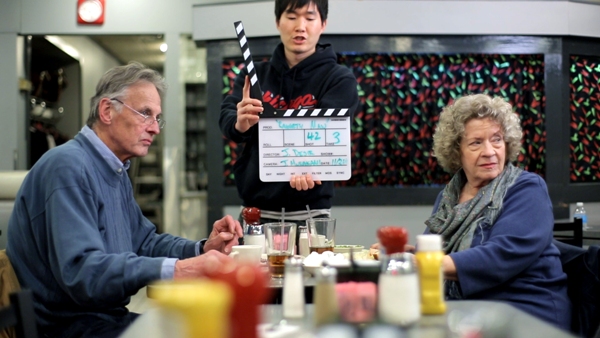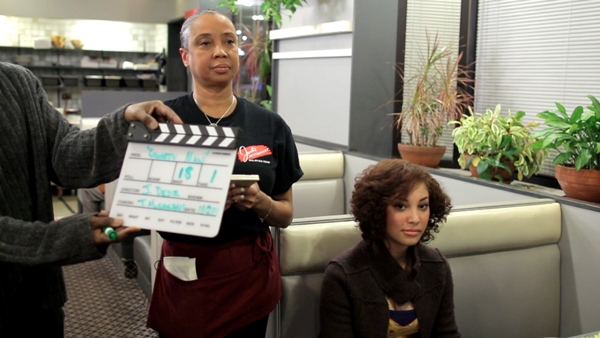| « Three Young Playwrights Awarded by Pegasus Players | Paranormal Activity: The Marked Ones, The Great Beauty, Aftermath & Liv & Ingmar » |
Film Thu Jan 02 2014
Raggedy Man: Exploring the Heart of the Homeless
For Brenda Blonski and Sharon Kimbrough, making the jump from the advertising industry has resulted in Raggedy Man, a good-natured short about the chance friendship between a woman and a homeless man whom she meets at a local diner. The duo, who respectively served as Senior Vice President/Creative Director and Senior Vice President of Broadcast Production Services at Burrell Communications, merged their talents and ventured into the art of filmmaking.
With Blonski as scriptwriter and Kimbrough on board as producer, Raggedy Man is the product of a true Chicago collaboration that includes director Julio Desir, Second City actors Aaron Burns and Jack McCabe, and music producer Morris "Butch" Stewart. Here, the ladies discuss their Burrell background, creating Raggedy Man, and why they hope the film will resonate for audiences, particularly when it comes to homelessness in America.
How did this collaboration come about? Did the two of you ever work closely on projects during your tenure at Burrell?
Blonski: Sharon and I have known each other for many years. We did work at Burrell and did a few different commercial projects together--some of them we thought would maybe make great television show ideas. After I left Burrell a year and a half ago, we still desired to do something creative together outside of the work environment. I had time on my hands and I came up with Raggedy Man. I went ahead and wrote that and I approached Sharon and said, "I have this script for a short film."
Kimbrough: I always respected Brenda as a writer; I've always thought she was a good, solid writer, and quite often, her concepts were stories that could be TV shows, so it just seemed like a natural thing to happen. I was jut really excited when she presented the concept to me--I just said, "Let's do it!"
Was Raggedy Man always going to be your first project? Were other projects on the table?
Blonski: There was a project that I had been toying around with that was based on a personal experience that I had. At first, I wanted to do that project but then Sharon and I decided before we approached doing a feature, we should get our feet wet with something shorter so we could get some experience in production outside of advertising. We do plan to do other short films, and eventually, we're gonna go ahead and tackle a feature.
Has filmmaking always been an interest of yours?
Blonski: When I was in school in Wisconsin, I was interested in producing films and I took some film courses; in fact, they used to call me "Cecil B. DeBlonski." [Laughs].
Kimbrough: Advertising really exposed me to a different world. Before I came to Burrell, I was a nurse; I worked at [Cook] County Hospital. I then got into advertising--I really just kind of stumbled into it. I happened to be working in the same building as Burrell and then I started to look for a job and a guy I knew told me about Burrell. I had no idea who Tom Burrell was. I started as a secretary and was later promoted and then I did some things that exposed me to film. I always like watching movies but making one had never crossed my mind.
In what ways would you say your marketing and advertising background has been benefited you in this joint venture?
Blonski: I'm going to quote our director, Julio Desir, who said, "Ladies, you know we were able to do this because in advertising--producing these little 30-second stories--we've been going to film school for the last 20 years." And we said, "That's true!" I mean, we know how to cast because we've been in casting sessions; although we weren't the ones running them, after being in them for over 20 years, we figured we should know how to do that. And when you're doing a small film and you're self-funding your project, you take on a lot of roles because you've gotta get things done.
Kimbrough: In doing this film, we realized that the things that we saw being done, we now had to do them. But you kind of jump into the mode and that's just what we did.
Brenda, I've read that homelessness is a sensitive subject for you and that with Raggedy Man, you wanted to explore the attitudes against and treatment of the homeless. Was there something you've seen, or weren't seeing, that compelled you to write the script?
Blonski: I've always had a heart for the homeless. I'm usually the one that gives people money and then see them the next day and hear them telling someone else the same scam they gave me the day before. But I actually tied a specific experience in--I was with my grandson at McDonald's and a man came in and he went from table to table asking for money for food. I said, "Excuse me sir, I'll get you something to eat." I took him over to the counter, had my $5 out, the crewperson took his order, and he said, "I'll have a 'double fish sandwich'." After he was told they were no longer making those, he said, "Yeah, but you can make it." He continued, "And then I want a side salad--and I want that new dressing--and I'll take a hot apple pie." He just made this order that was far beyond the $5 I had in my hand; I mean, I was sure he was gonna go to the "Dollar Menu!" [Laughs]. I had never experienced that and I thought it would be a nice way to do a homeless story with a little bit of light humor. I wanted to take a different approach.
As things got underway and you began to write, cast, assemble your team, etc., what were your initial thoughts?
Kimbrough: My initial reaction was, "Okay, we're really gonna do this film!" I wasn't afraid of the challenge, but I knew it would be something different than I had ever done before. We started putting together a budget and a calendar and started talking to people and just started to make the project happen.
Blonski: Sharon actually initiated us going to a class or two to get some background on how we should make this come to life--to see how different it is from doing commercial work. We went and approached other people in terms of directing the film and then, there's a very good friend of ours that we worked with over the years who recently got into film production. He has a facility for editing and access to shooting equipment and that's basically how it came to fruition.
Since the project was self-funded, was it tough getting folks on board with such a limited budget?
Kimbrough: What we did was tap into people who we've known and worked with before, like Butch Stewart. Also, people read the script--Brenda really sold them with her script, which kind of got them on board. In terms of the actors, we had to use at least one from the Screen Actors' Guild. We went to a seminar that talked about our film being considered as a Screen Actors' Guild film if we hired at least one SAG person--we actually hired two. And the other actors just wanted an opportunity to act, so they were willing to do it.
Besides funding, were there any other challenges in completing this project?
Blonski: Well, time was a key factor; a lot of the people we were working with had other jobs.
Kimbrough: We were committed that we were gonna do it before Thanksgiving and it worked out. Things fell into place very nicely.
As you know, Chicago is loaded with film festivals all throughout the year--do you plan to enter Raggedy Man in any of them?
Kimbrough: Yes, we do plan to enter it into one of the many film festivals here in Chicago; we're Chicago people so we definitely want to do that. And we will enter it in other places, too.
Blonski: We haven't specifically narrowed it down yet, but the other thing we're planning to do is partner with organizations that help the homeless and have our first screening with an organization like that here in Chicago.
Speaking of Tom Burrell, as you know, a documentary on his life is currently in production. What do you think the documentary's impact will be?
Blonski: I would say most of us looked at Tom Burrell as the father of African-American advertising because Burrell was always considered not just the biggest, but the best. Anything coming out of Burrell with Tom Burrell's name on it had to be stellar. He certainly helped to train many of us in the advertising business that went on to do amazing things in other areas.
Kimbrough: Tom Burrell changed the life of so many African-Americans in the advertising business. He'd tell our clients that you can't just advertise to black people the same way you do to white people--you have to speak to our hearts. You've got to talk to us and it'll make a difference in your sales. And he proved that. He's got a great story to tell.
Now that you've done Raggedy Man, do you plan to collaborate again?
Blonski: I think our entire team was pumped and Julio is excited about doing something further. And a lot of the actors want to know when the next project is; in fact, one of the SAG actors wanted to know how he could contribute to our next project. He said, "This is such a great story-can I forego my fee?"
Kimbrough: It was very sweet of him. I thought it was very kind of him to want to do that and think enough of us to want to contribute to whatever our next project is.
Is there a message or lesson you want people to take away from Raggedy Man?
Kimbrough: You really don't know the story behind why people are where they are and I think this movie gives it a little twist that still makes it heartfelt, but just adds a little something else to the story.
Blonski: The last line that is spoken in the movie is from a homeless woman holding her change cup up to the camera, and speaking to anyone who's watching. She says, "Spare some change?" And to me, that says, "Can you change your mind about the homeless? Can you give of yourself? Can you make a mind change? Can you 'spare' the time to think about what being homeless really means?"
Look for the premiere of Raggedy Man January 2014. For more information, contact 312-497-8522 or email skimbrou@msn.com.











J L Rivera / January 2, 2014 3:24 PM
Very nice interview. Having known Brenda for a long time, and knowing her love and commitment to her craft, I am already looking forward to seeing her work.